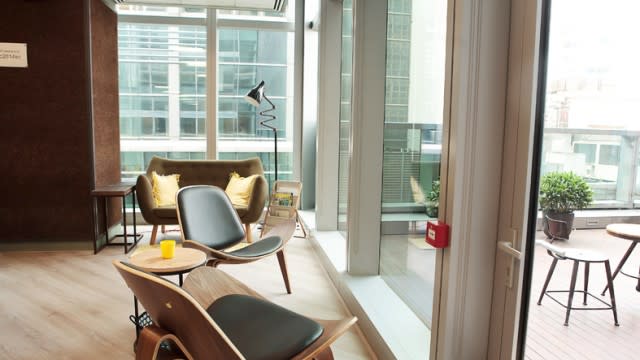Garage Society and the business of building a thriving tech community in Hong Kong
e27 chats with Garage Society Co-founder Elaine Tsung on running a successful coworking space and plans going forward
Coworking space at Garage Society’s Queen’s Road Central location.
Garages have long been thought of as hubs that harbour tech innovation.
The garage in Silicon Valley, where Steve Jobs and Steve Wozniak created the very first Apple computer is now a historic site. But since there are few garages to tinker around in Hong Kong, Garage Society is aiming to be every startup’s figurative space for creativity.
Garage Society is Hong Kong’s most expensive coworking space, yet it is also arguably one of the city’s most successful.
A full-time desk at the Des Voeux Road location in Central Hong Kong costs HK$5,800 (US$748) a month. At the Queen’s Road Central Garage, situated next to the Sheung Wan MTR, a desk is HK$4,800 (US$619) monthly.
That price tag, however, hasn’t kept Garage Society from being one of the most populated and popular work hubs in Hong Kong; it boasts a current 90 per cent occupancy rate since the first location opened in April 2014.
Airbnb. KFit. Twilio.Uber. Yelp. The community that bunks down in Garage Society is almost a battle of tech stars, with aspiring ones to boot. It also helps that Hong Kong’s branch of entrepreneur training hub General Assembly has taken up almost half the floor below.
Current success isn’t much to fawn over for Co-founder Elaine Tsung, who is aware of both the competition and of the dangers of falling into complacency, as a business.
“Being a coworking space means more to us than just real estate. Anyone who has money can build a coworking space these days. That’s the truth in Hong Kong,” says Tsung, as she chats with e27 in Garage Society’s spacious outdoor patio on the ninth floor, which provided a rare glimpse of a calm Hong Kong financial district.
“We are charging quite a lot more than other stakeholders. But we justify the price, because we don’t stop (trying) just because we have a good location,” she explains.
Tsung founded the space with Edward Man, her business partner who works more on the “number side of things”.
The two met in the US at the University of Michigan, as students from Hong Kong studying overseas, almost two decades ago. They caught up for a few rounds of drinks in 2013, when Tsung was “complaining like crazy”, partly because of the wine, but mostly out of frustration.
“I found the Central space (Garage Society’s current flagship location) when the building was still under construction. I checked out the site wearing protective clothing! I was whining that here’s this amazing place with coworking space potential, but I didn’t have enough (money) to do anything about it,” says Tsung.
To her surprise, Man rang up the next day and voiced interest in investing in the project because he believed in Tsung’s vision.
Since then, Garage Society has grown to include a second branch, both following the three cos of the business: co-work, co-learn (they just spearheaded a new monthly series called INSPIRE) and co-invest. It has set up its own proprietary fund, Garage Society Investment Partners, which invests in startups that focus on lifestyle and social impact.
Tsung chatted with e27 on the hot real estate market that is coworking spaces and how she went from briefly working corporate to running a coworking initiative.
Here are edited excerpts of the interview:

Elaine Tsung, Co-founder of Garage Society
Tell us about your background. You weren’t always in the startup / coworking scene…how did you fall into it?
I used to be more on the corporate side of things. I worked in Channel Development at South China Morning Post where I focused on B2B businesses.
Then I met the Co-founder of The Hive and he brought me onboard as the Director when they were opening up their new space. That was my first venture into coworking spaces and the scene in Hong Kong.
Also Read: OzAPP Awards Road Show: The Hive Wan Chai
What was it like jumping into the startup scene?
I’m lucky because from Day One I met people like Casey (Lau) and Gene (Soo) from StartupsHK, Allison Baum from General Assembly and now various people at Fresco Capital. People know you are working quite hard and the support they consequently give you is enormous.
It’s still a new industry here in Hong Kong, so you need to trust yourself, yet be flexible. I keep a very open mind whenever people give me feedback.
Some people working in startups are too hot-headed. Listen to the market if you’re running a business. You need to pay your bills, pay your staff and work hard.
It’s a cruel world and Hong Kong is a good place to toughen yourself and face hostilities.
One of your first tenants was General Assembly (GA). How did this deal happen?
At the beginning, I told everyone about the space we were opening and I would tell people to let their contacts and friends know too. I knew about GA prior to them coming to Hong Kong as I had met Allison (Baum).
We chatted and talked about what value GA could bring for them. They were the first to come on board. We custom-built two classrooms for them!
After GA came Fresco Capital, our other anchor tenant, which really started things rolling and established our presence.
Also Read: Hong Kong’s Fresco Capital expands to Tokyo, Japan

The main lobby of Garage Society’s QRC location.
Is the community curated? Have you rejected members? It comes across as a very international community…do you worry that there’s not as much local representation?
Honestly, in the beginning, you might be less picky to fill the space. That’s the business side of things; you need to drive revenue. Now, we can pick quality members. We meet with everyone who comes into the space because we want to see what they do and how we can help.
Some startups are too entitled and feel the world should cater to them. There are sometimes people who might not be best for the community.
For knowledge exchange, it is key to have an international community. We like that we have a diverse crowd, it’s crucial for tech.
When did Garage Society start profiting? What are the differences between the two locations?
Within a year, we were making profits. The Central location is convenient for startups. VCs are based in Central; it’s the main financial area.We do see that more tech startups like Sheung Wan. At the end of the day though, it’s a 10-minute walk.
What startups has Garage Society invested in?
One is Boxful, a storage solution startup making headway in Hong Kong, and another is Yeechoo, a startup that provides dress rentals.
InvestHK cites that there are 34 coworking spaces in Hong Kong, compared to three in 2010. Is this really indicative of a shift in the ecosystem?
The number of coworking spaces might not be the best indicator of how mature the startup ecosystem is in the city or the country. But it is difficult to come up with a quantitative measure
The key attribute of a coworking space is to have people who work together. That’s what differentiates one space from another.
It’s easy to just do real estate. Getting an office is the hardest for startups, and it’s not just the money. Landlords are a nightmare!
There are a lot of interesting coworking spaces in Hong Kong, but a mistake would be to get spoiled by the real estate here.
What do you mean by “getting spoiled by the real estate here?”
Because of the real estate value in Hong Kong, a coworking space might not need to do much. But it’s frustrating to see someone just courting a space and slapping on the word ‘coworking’. It’s a term too broadly used now in Hong Kong.
We try to provide value and more of the software. That’s the toughest part.
The coworking industry here is pretty small. My friend had told me about a new coworking space in Central called Wynd. I went there to accompany my friend, turns out the space wasn’t even open yet!
We walked in on the three co-founders having a meeting, and they recognised me. But it’s funny, because we are friends now.

Glimpse into the patio area at the QRC location
Are you considering starting an accelerator programme? If so, would you find corporate backing?
We wouldn’t want to run programmes for the sake of running programmes. We don’t want to sell out our community.
If corporations or a sponsored accelerator programme can come in and add value, I wouldn’t say no. But to be frank, we don’t quite believe in accelerator programmes.
I think business is about adapting. There shouldn’t be a time frame on that — it’s not about three, six or nine months. That framework doesn’t work. We are about bringing in a platform to aid business to grow and adapt.
What’s the game plan down the line for Garage Society?
We are already looking into another space, although it’s hard as we must find one with an outdoor terrace. That’s our trademark!
We want to grow both vertically and horizontally, more on the latter. We want the startups in our community to grow faster; the way this happens is through resources.
I’m not gonna say, “oh we’re changing the landscape of Hong Kong”. The landscape is already changing. Industry-wise, it used to be just banking and finance. But even in finance, there’s a lot of disruptions. Fintech is big.
We have internship programmes, and we try to show youth that there’s other industries to be in.
I’m not a corporate person. Many people aren’t, they just don’t know other options. You could work at a startup and be paid more than an entry-level job (laughs). It’s a good business to be in.
Also Read: Top 3 co-working spaces for technology entrepreneurs in Bali
The post Garage Society and the business of building a thriving tech community in Hong Kong appeared first on e27.



